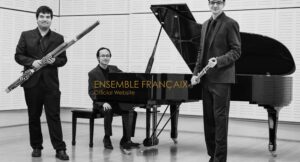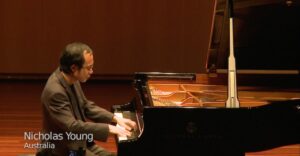More News about Nicholas …
We have long known of his virtuosity as a pianist … but now we would also like to acknowledge his achievement as a scholar …
Moving Into Music would like to take this opportunity to offer:
Congratulations to Nicholas Young for academic accomplishment … recently conferred Doctor of Philosophy
Introducing Dr Nicholas Young, PHD …
here is a citation of his thesis:
… “investigated the editorial interventions of Busoni, Cortot, and Schenker in their publications of canonical piano repertoire. His study provides unique insight into the aesthetic principles for the reception of such publications and furthermore proposes how these editorial acts can be understood as unique pursuits of an artistic ideal.”
For further reading we refer you to the abstract from University of Melbourne repository:
https://minerva-access.unimelb.edu.au/handle/11343/241364
Description
© 2020 Man Chung Nicholas Young
Abstract
Scholarly criticism of music notation tends to focus on the intentions of the composer, and neglect or dismiss the artistic agency of the editor. The famous notion of Werktreue, likewise, implies that the will of the composer is the only legitimate source of artistic intention. These attitudes run counter to the rich tradition of interventionist editing in nineteenth and early-twentieth centuries, when editors put forth important aesthetic claims by emending the musical text that represented canonical repertoire. This study proposes the reception of interventionist music editions as a type of Work, using the frameworks of aesthetic and literary criticism on Works of Art, and the Goehrian theory of work-concept. From this proposition is introduced the concept of ‘Edition-Text’ as the text of an Edition-Work, which is a separable entity from the text of a Composition-Work. The study applies these notions to the preliminary analysis of publications of canonical piano repertoire, edited by the three contemporaneous pianist-scholars Ferruccio Busoni, Alfred Cortot, and Heinrich Schenker. It commences with a survey of the three editors’ historical and aesthetic contexts, followed by a comparative study of a selection of their respective edited publications, the Busoni-Ausgabe, Editions de travail and Erlaeuterungsausgabe. A range of observations are gathered on the substance and style of the Edition-Texts as manifest by a range of notated and literary phenomena, from which comparisons are made of the editors’ contrasting intentions and ideals concerning the cognition and sensory expression of music. It also considers how these editorial acts, in their critique, extension and worship of the Composition-Text, can be understood as pursuits of artistic ideals that strive beyond the perceived achievements of the referent compositions and composers, and therefore assert their claim to being a Work in their own right. The study concludes with remarks on the opportunities granted by future technologies for the improved presentation of Edition-Works, and suggestions for how performance may be best informed through a wide study of historical and contemporary editions.
Keywords
edition; editing; music; piano; Busoni; Schenker; Cortot; Bach; Chopin; Beethoven; interventionist; work-concept; repertoire; canon; publication; sheet music



